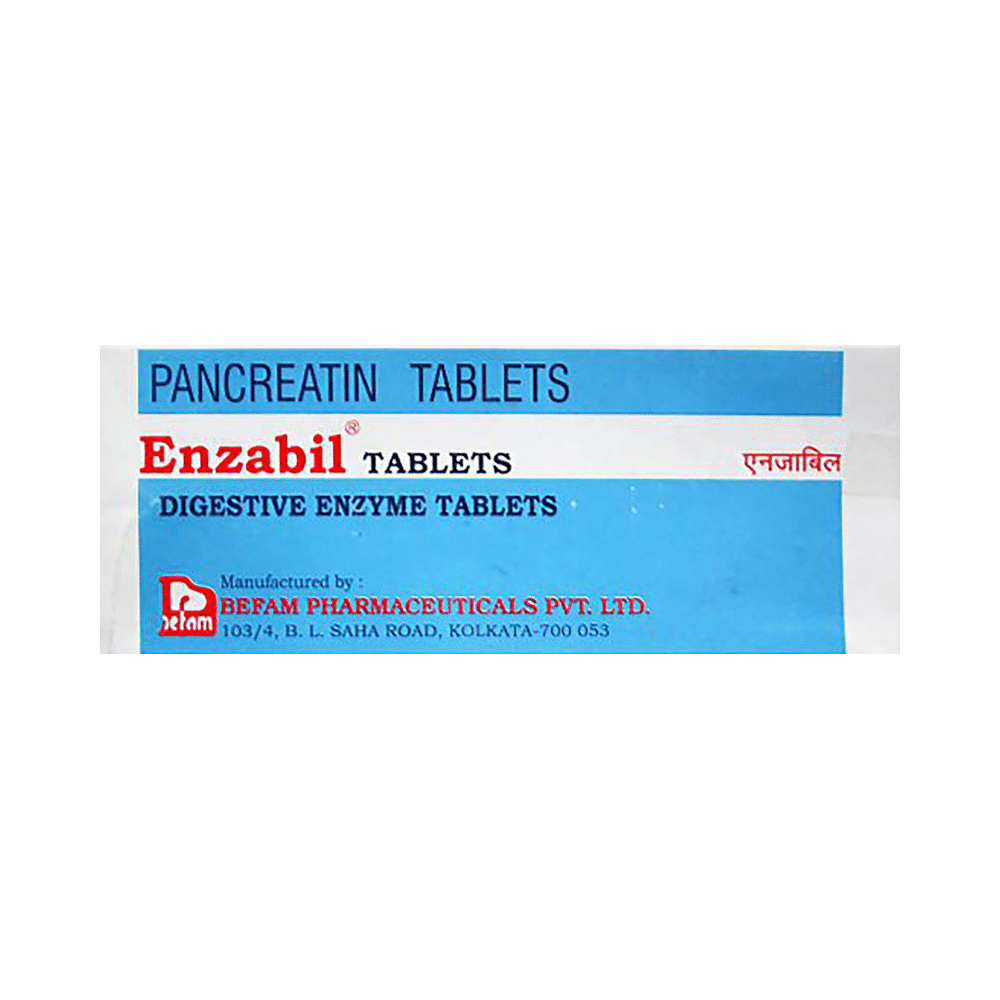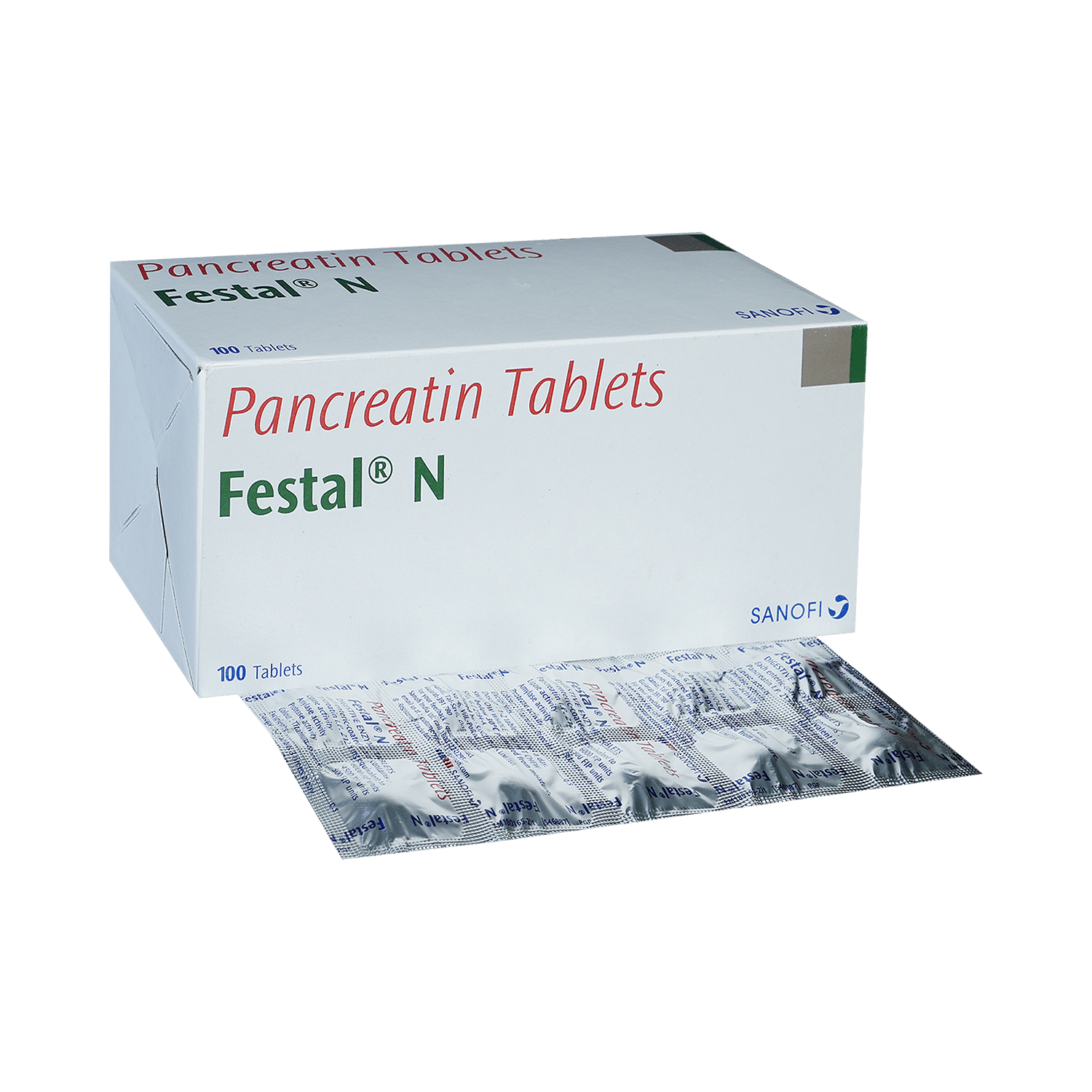
Enzabil Tablet
Manufacturer
Befam Pharmaceuticals Pvt Ltd
Salt Composition
Pancreatin (212.5mg)
Key Information
Short Description
Enzabil Tablet is used to treat pancreatic enzyme deficiency. It is a pancreatic enzyme supplement that helps in digestion.
Dosage Form
Tablet
Introduction
Enzabil Tablet should be taken during or immediately after eating a meal or a snack with plenty of water. This helps the enzymes mix with the food so they can help digest it. The dose you’re given will depend on your condition and how you respond to the medicine. You should take this medicine until your doctor tells you to stop. You may be taking it for the rest of your life so get into a routine and make sure you take it regularly. Enzabil Tablet may only be a part of your treatment which could include a special diet. The most common side effects of this medicine include stomach pain, abdominal bloating, and diarrhea. If these bother you or won’t go away, let your doctor know. There may be ways of preventing or reducing these effects.
Directions for Use
Take this medicine in the dose and duration as advised by your doctor. Swallow it as a whole. Do not chew, crush or break it. Enzabil Tablet is to be taken with food.
How it works
Pancreatin is a pancreatic enzyme supplement. It mixes thoroughly with food and helps in digestion.
Quick Tips
You have been prescribed Enzabil Tablet for the treatment of pancreatic enzyme deficiency. They lower stool frequency and improve stomach pain and stool consistency. Take it during or immediately after a meal or a snack as per your doctor’s advice and drink plenty of water. It can cause mouth irritation so do not chew, crush or hold it in your mouth. Swallow the medicine completely. Inform your doctor if you experience severe or long-lasting abdominal pain.
Related Medicines

Festal N Tablet

Panvizyme 212.5mg Tablet

Hizyme N 212.5mg Tablet

Panstal N Tablet

Pankriodax Tablet

Serutan 212.5mg Tablet

Serutan 212.5mg Tablet

Biopank 212.5mg Tablet

Neutrizyme P Tablet
Frequently asked questions
What does Enzabil Tablet help with?
Enzabil Tablet is a pancreatic enzyme supplement containing a mixture of enzymes. It is prescribed for individuals whose pancreas produces insufficient amounts of their own enzymes, hindering the digestion process. Additionally, it may be used to address digestive issues arising from surgical removal or impaired pancreatic function.
Is Enzabil Tablet safe to take?
Enzabil Tablet is generally safe for patients receiving its prescribed dosage for digestive issues related to the pancreas. However, it can lead to a surge in blood uric acid levels, potentially exacerbating existing gout and causing painful swelling of joints. Potential side effects may include allergic reactions such as skin rashes, swollen lips, increased flatulence, stomach pain, headache, dizziness. Before starting Enzabil Tablet, consult your healthcare provider, including providing information about allergies and other medications you are currently taking.
How should I take Enzabil Tablet?
Swallow the capsule whole with food. It is essential to consume a high volume of fluids after administering Enzabil Tablet. Ensure adequate fluid intake while on treatment.
What food should I eat if I have pancreatic enzyme insufficiency?
To ease digestion, it's recommended to consume small, frequent meals. Embrace a balanced and low-fat diet that minimizes the consumption of saturated and trans fats. Prioritize whole grains, fruits, vegetables, lean protein sources (like chicken or fish), legumes, and low-fat dairy products. Maintaining proper hydration is crucial by drinking plenty of fluids throughout the day.
Can Enzabil Tablet be given to children?
Yes, Enzabil Tablet can be administered to children. Similar to adults, children should consume sufficient fluids while on treatment with Enzabil Tablet. When giving it to infants aged 12 months or younger, consider opening the capsule and pouring the contents directly into their mouths. Subsequently, you can administer breast milk or infant formula to your child. Avoid mixing the medication directly with the formula or breastmilk.


